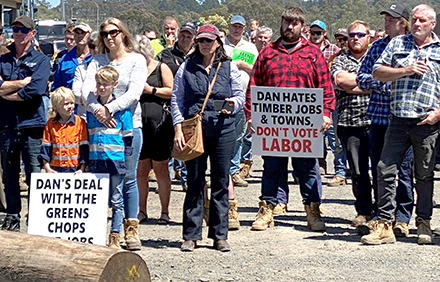Really, what more can be said about Tuesday’s shocking Victorian State Government decision to shut down the native timber industry six years early.
The decision has been rightly labelled as flawed, disgraceful, gut-wrenching and devastating.
It is truly hard to fathom why such a decision was reached.
If it wasn’t so insulting the headline on the State Government’s Press release on Tuesday announcing the decision would be laughable.
“Delivering Certainty For Timber Workers” it said.
Really? Is that what they have done?
The impact of this decision will be swift and far reaching.
Country towns in Eastern Victoria will be gutted.
Investment in the towns will dry up as people leave town seeking jobs elsewhere.
Businesses in East Gippsland directly or even indirectly tied to the native timber industry would have in place business plans and strategies to accommodate them over the next six years and beyond.
Those plans are now in tatters. Instead of six years, they have six months.
Rumours began circulating four years ago that young forestry workers were already leaving the industry early.
That will now become a flood.
Harvest and haulage contractor Rob Brunt told the Weekly Times this week that he would be laying off his 15 employees at the end of June.
He pointed out that those employees would have difficulty selling their houses.
And Mr Brunt said he would be forced to sell his plant and equipment into an already flooded market.
The State Government announced an additional $200 million in support for workers and their families to transition away from native timber logging but there are already fears little of that money will actually trickle down to where it is needed.
The State Government blamed the industry’s problems on among other things “prolonged legal action and court decisions”.
The gross insult of that statement is that the “legal action and court decisions” could have been avoided if the State Government had stepped in.
But it didn’t. It just sat on its hands.
Forestry Australia president Dr Michelle Freeman nailed it when she said the consequences of this decision had not been considered.
This decision, she said, will disproportionately impact on the mental health, wellbeing and economies of regional communities that depend on this sector.
She is of course spot on.
But that, sadly, is just the tip of a very big iceberg.






